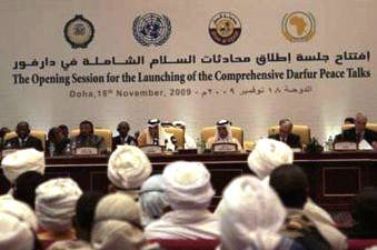Sudan, Darfur rebel group agree to open peace talks in Doha
October 22, 2012 (KHARTOUM) — Sudan’s government and a splinter faction of the Justice and Equality Movement (JEM) agreed Monday in Doha to immediately cease hostilities and hold peace negotiations in line with the Doha Document for Peace in Darfur (DDPD).

JEM Interim Military Council president, Mohamed Bashar since last month said they are willing to hold direct talks with the Sudanese government after a meeting gathering senior military commanders who decided to distance themselves from JEM leader Gibril Ibrahim.
“The two parties signed a declaration affirming their commitment to the Peace Process and to immediate cessation of hostilities and decided to resume negotiations in order to achieve a comprehensive settlement of the conflict on the basis of the DDPD,” reported a statement released by the mediation.
The Qatari Deputy Prime Minister Ahmed bin Abdullah Al-Mahmoud and the acting UNAMID chief and joint mediator, Aichatou S. Mindaoudou attended the intensive consultations between the two parties.
The mediation further said that “The two parties agreed on a time-frame to start talks after Eid Al-Adha Al-Mubarak,” which will start on 26 October.
Speaking to Sudan Tribune from Doha, the spokesperson of the military council Ali Wafi stressed that they agreed with the Sudanese government to discuss all the seven chapters of the DDPD, pointing out that many items of the deal signed by the Liberation and Equality Movement (LJM) on 14 July 2011 have not been implemented.
“What can be reached will added in form of attached annexes to the peace agreement,” he added.
The rebel faction broke formally with JEM after holding a meeting on 8 and 9 September but the issue began on 9 August when the movement’s leader Gibril Ibrahim removed the General Commander Bakheit Abdallah Abdel Karim Dabajo from his position .
JEM Interim Military Council has to hold a general conference, following that a negotiating team will be formed to take part in the talks with Khartoum.
Wafi said initially that the conference had to be held within 45 days but decided to extend it for more 20 days, adding that the meeting will be held during the first week in Darfur. He also confirmed that members of the executive council will participate in the conference.
Earlier this week a group of eight members of JEM executive council led by Abdel-Rahman Ibrahim Panat issued a statement criticising the leadership of Gibril Ibrahim and supported the move of the military commanders against him saying it will allow democratic practices within the group to be restored.
The joint mediation in its statement called on the holdout rebel groups to “to follow suit the Justice and Equality Movement and soon join the peace process with a view to alleviating the suffering of the population and restoring peace to all parts of Darfur”.
After refusing to sign the DDPD despite its participation in the Doha process, JEM formed a rebel alliance together with two other factions of Sudan Liberation Movement led by Abdel Wahid Al Nur and Minni Minnawi and Sudan People’s Liberation Movement–North (SPLM-N) in November 2011.
The Sudanese Revolutionary Front (SRF) believes that partial peace deals are not productive and says that Khartoum does not implement them. They propose to use military and political means to topple the regime and establish a democratic regime guaranteeing the rights of the various regions and bring officials accused of war crimes to justice.
However Khartoum and SPLM-North are under huge international pressure to settle their differences about the Blue Nile and South Kordofan where they have been fighting since June 2011.
The African Union Peace and Security Council is expected to discuss the issue next Wednesday and UN Security Council will tackle it following this meeting.
(ST)
